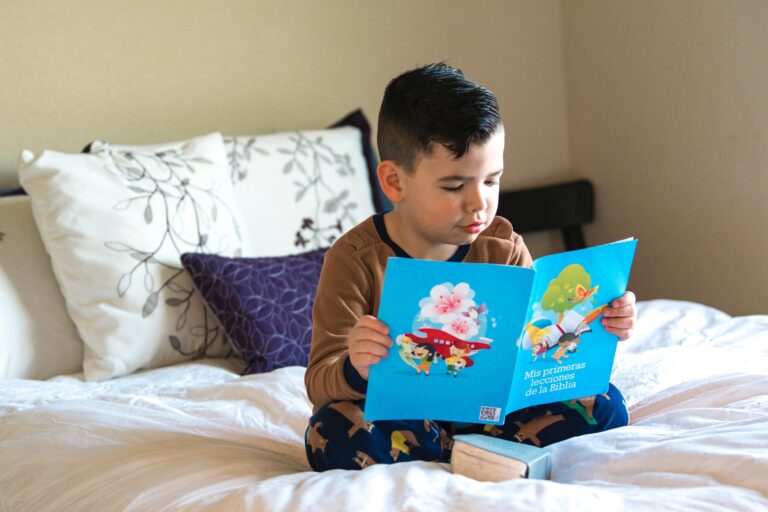Why Boredom is GOOD for Your Child & How to Let it Happen
As a parent, you’ve likely heard the phrase, “Mom, I’m bored!” more times than you can count, leaving you to wonder about what the experts are saying when they rattle on about why boredom is good? It’s tempting to respond with a quick fix—whether it’s turning on the TV, handing over a tablet, or suggesting an activity that fills the gap.

Play. Learn. Thrive.™ only endorses products we authentically love and use. Some of the product links in this post may be affiliate links. That means that if you click them and make a purchase, this site makes a commission. Play. Learn. Thrive.™ is also an Amazon Associate. As an Amazon Associate, we earn from qualifying purchases. It will have no impact on the price you pay or the experience of your purchase.
In a world where screens are always within reach and schedules are often packed with organized activities, boredom can feel uncomfortable, both for kids and parents. But what if I told you that boredom is not a problem to solve but a valuable opportunity your child needs now more than ever?
Before we dive in, here’s a little about me so you know you’re getting advice from someone who’s been in the trenches! I’m Alanna Gallo, a former teacher with a master’s in education who saw firsthand how kids were losing confidence, independence, and their natural love of learning. I left the classroom to help parents raise curious, capable, and screen-conscious kids in a world that doesn’t make it easy. My work has been featured in major media outlets, and I’m here to give you real, research-backed advice—without the guilt trips or unrealistic expectations.
Boredom encourages personal growth, sparks new ideas, and pushes children out of their comfort zones, allowing them to explore new interests and develop critical problem-solving skills.

The Struggle to Let Kids Be Bored
I remember the first time my daughter said she was bored. My initial instinct was to fix it. I rattled off a list of activities: “You could draw, read a book, or build with your blocks!” But when she refused, looking for something more exciting, I felt that familiar tug of guilt.
Should I be doing more? Should I help her fill the time?
The reality is that this urge to constantly entertain or provide structure stems from a modern-day misconception: that every moment of a child’s day needs to be filled with purpose, productivity, or entertainment.
In fact, periods of boredom—those unstructured times without constant stimulation—are where some of the benefits of boredom come to life.
Allowing a child to experience boredom can spark new ideas, help them explore new interests, and foster personal growth by pushing them out of their comfort zone.

But here’s the truth—we weren’t always like this. Previous generations of children had long, unstructured hours where they were left to their own devices, and in that space, they developed creativity, independence, and problem-solving skills.
Now, in a world dominated by screens and constant outside stimulations, our children rarely have the opportunity to get bored—and they’re missing out because of it.
Boredom offers a valuable opportunity for kids to step out of their comfort zone, allowing their minds to wander, spark new ideas, and foster creativity. Without these moments, children lose the chance to build important skills like problem-solving and emotional resilience.
Why Our Kids Need Boredom More Than Ever
In today’s fast-paced, tech-driven world, children are constantly bombarded with instant gratification.
Whether it’s the constant availability of YouTube videos, the ease of swiping through video games, or structured extracurriculars that leave no room for downtime, our kids rarely have a moment where they’re left to just “be.” But boredom is essential for their development, offering benefits that no app or structured activity can provide.
Periods of boredom give children the chance to explore new ideas, tap into their creativity, and even foster personal growth.
Without these valuable opportunities for unstructured time, children miss out on developing problem-solving skills, emotional regulation, and the ability to step outside their comfort zone.
Boredom teaches children how to tolerate being still, sit with their thoughts, and explore their inner world. According to Dr. Sandi Mann, a psychologist and boredom researcher, when children are bored, they look inward, which leads to creative thinking and problem-solving. In fact, many great ideas are born out of moments of boredom because children learn how to rely on themselves for stimulation.
The Science Behind Boredom: What Research Tells Us About Why Boredom is Good
Research by Dr. Teresa Belton from the University of East Anglia reveals that boredom fosters imagination by allowing children to use their own resources to create mental stimulation. Without external distractions, children are more likely to daydream, engage in self-directed play, and even tackle complex emotions they might otherwise avoid.
In addition, studies have shown that overscheduled children often experience higher levels of stress and anxiety.
Without the opportunity to experience boredom, kids can grow up dependent on external stimuli, leading to difficulties in managing their emotions or handling quiet moments. Boredom offers a necessary mental reset—a pause that allows children to decompress and develop resilience.
According to experts like John Eastwood, a professor at York University, and James Danckert, boredom plays a crucial role in brain health, offering children the chance to recharge their cognitive resources.
Allowing kids to engage with their own boredom without rushing to fill the time can prevent mental fatigue and help them better manage life's challenges.

Boredom in Action: What It Looks Like and Why It’s Hard
When I first decided to embrace boredom in my home, it wasn’t easy. I vividly remember a rainy afternoon when my son, with no access to screens, started pacing around the house.
His frustration was palpable, and it took everything in me not to suggest a game or activity. He asked for TV a few times, and I told him it wasn't an option. He sat there sulking for a little while, and then something amazing happened.
He picked up a toy truck that he had since he was little and started playing with it. He sat there for almost 20 minutes, just rolling the truck around on the couch cushion next to him. Then he got up, went to our playroom, and started playing with his LEGO—never saying another word about being bored (and not asking for TV again).
Boredom gave him the space to think, experiment, and solve problems on his own. I’ve learned that it’s okay to let them be uncomfortable for a bit—it’s part of the process.
This discomfort is where the magic happens, and soon enough, they’re engrossed in something of their own creation, using their imaginations in ways that never would have emerged if I’d stepped in.
It’s during these moments, free from external stimulation that children are able to strengthen their problem-solving skills, explore new interests, and even come up with different ideas for how to engage with their environment.
Boredom offers them the chance to step outside of the status quo, fostering creativity and emotional resilience.
Practical Tips for Embracing Boredom in the Home
Allowing your children to experience boredom doesn’t mean leaving them without guidance. Here are a few simple strategies to help you make boredom a regular and beneficial part of your family life:
- Set aside screen-free time: Establish blocks of time when screens are off-limits. During these moments, encourage your children to find their own activities without suggestions from you.
- Create a boredom jar: Fill a jar with play ideas for when boredom strikes. Direct your child to choose something from the jar if they are finding it hard to come up with something.
- Encourage free play: Free, unstructured play is where creativity thrives. Allow your children to direct their own playtime without interference.
If you’re looking for inspiration, my 50 Screen-Free Activities guide is packed with simple ideas that can help your children find joy in downtime and inspire creative play. You’ll be amazed at what they come up with when given the space to be bored!
The Long-Term Benefits of Boredom
The benefits of boredom extend far beyond just filling time. Boredom helps nurture life skills like patience, problem-solving, and independence.
- It teaches kids that they don’t need constant entertainment to be happy and encourages a growth mindset.
- They learn that it’s okay to sit with discomfort, and this resilience translates into other areas of life, from schoolwork to friendships.
- Allowing children to experience true boredom helps them develop self-control skills and organizational skills, which are crucial for managing tasks and responsibilities later in life.
- By allowing your children to be bored, you’re helping them become more confident, self-reliant, and resourceful. In the long term, they’ll be better equipped to navigate a world that demands critical thinking and adaptability.
- Boredom encourages children to engage with new experiences and explore new angles on familiar tasks, making them better problem solvers and more creative thinkers. This valuable opportunity also helps them foster lifelong learning as they develop the ability to explore different ways of doing things.
Overcoming the Fear of Boredom
I get it—letting your children experience boredom goes against the grain of modern parenting. We’re constantly bombarded with messages about enrichment, productivity, and keeping our kids “busy.”
But embracing boredom is about more than just downtime; it’s about giving your children the tools they need to thrive in a fast-paced world.
Allowing them to have unstructured time, free from organized activities, fosters self-reliance and strengthens their ability to engage with their own thoughts.
It’s okay to feel uncomfortable when your child says they’re bored. In fact, that discomfort might be a sign of growth.

By giving your child the opportunity to experience boredom, you’re allowing them to cultivate essential skills that will serve them for life, such as problem-solving, emotional regulation, and a better relationship with their own boredom.
This discomfort helps them develop resilience, creativity, and the ability to adapt to new situations—skills that will be invaluable as they navigate a world filled with constant change.
Ready to Embrace Boredom? Start Here
If you’re ready to start embracing boredom and want more tips on how to create a screen-conscious, boredom-friendly home, my e-book, Growing Beyond Screens, is a great place to start. In this guide, you’ll find practical advice for reducing screen time while fostering creativity and independence. Plus, when paired with the 50 Screen-Free Activities guide, you’ll have endless ideas to spark your child’s imagination.

50 Simple Screen-Free Learning Activities for Curious Kids
These 50 hands-on activities help children develop problem-solving skills, creativity, and real-world knowledge—without needing a screen. Designed to encourage self-directed play, hands-on discovery, and deep learning, this guide gives you a simple way to turn everyday moments into powerful learning opportunities.
Why Boredom is the Gift Your Child Needs
Boredom isn’t something to fear—it’s an essential part of childhood that fosters creativity, resilience, and independence.
By letting your children be bored, you’re giving them the freedom to explore their world, use their imagination, and develop critical life skills.
While we often wonder why are screens good, it’s important to remember that while screens offer educational content and entertainment, they can't replace the benefits of boredom.
So next time you hear, “I’m bored,” smile and know that you’re giving your child a valuable gift—time to think, grow, and become more self-reliant.
Inspired by this post? Be sure to subscribe to my newsletter for more insights and resources on raising confident, lifelong learners, and follow me on Instagram for a deeper dive in day-to-day parenting! Can't wait for you to join me!







